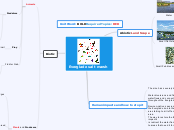
Everglade salt marsh
Abiotic Land Scape
Water
Small flat Islands

Small Pebbles and rocks on marsh floor
Human impacts and how to stop it
The size has severely decreased
Water diversions and flood control projects have cut water flows and connections between the wetlands and throughout the Everglade.
Now non-native species have started to take over
the Everglade due to the changes we made and they are starting to kill off animals that are native to the area.
The way to restore the the ecosystem from our impacts
is redirect the water from flowing to the gulf and ocean to areas that need it for environmental restoration.
Biotic
Animals
Fish

Perch
Gambusi
Producers
Mud Algee
Spartina alterniflora
Predators

Snail Kite commonly lives in tropical marshes and primarily eats snails and is also is endangered and commonly die to boat propeller.

Mink are semi-aquatic, carnivorous mammals and are listed
as a threatened animal
Prey
Periwinkle Snail
Fiddler Crab

Herbivore crab that excavate complex burrows that aerate the soil.
Plants and Producers
Sedges
cumbungi
Cyperus
common reed
Phragmites
Herbs
forbs
